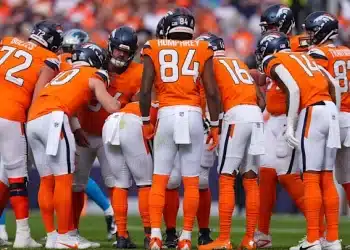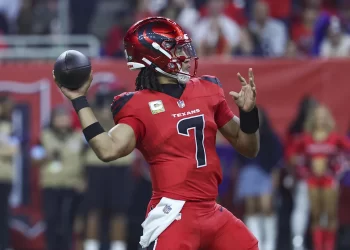By: William Carroll
There are too many impressive young people playing collegiate athletics to celebrate them all individually. When I try to locate the subjects of my interviews I look at on-field performance, athletic ability, and leadership. I could interview 1,000 players and still have thousands more that I had missed. Bryan Marine is a true student-athlete at an institution that is very renown for academics. As a player he totaled 10 career interceptions, 42 passes defended, 242 total tackles, 192 of them solo, he forced seven fumbles and he’s made all-conference and some All-American teams. At 5’9″ 183 he’s no giant, but he plays bigger, he forces turnovers and is not at all shy about contact. With the increased importance of the ‘nickel’ cornerback, I can see a role for him at the next level. I give you Draft Blue Light Special Bryan Marine CB from Bucknell.

William Carroll: I have had the pleasure of watching your career from your time at Calvert Hall College High in Baltimore, MD. What would you say are the five most significant and best lessons you’ve learned on your journey?
Bryan Marine:
-Always listen and believe in yourself.
-Never strive to prove doubters wrong, instead work to show your supporters right
-it’s okay to fail, as long as you gave it your 100% and learned from it.
-never burn bridges
-do the right things when people aren’t watching so it becomes second nature.
WC: The next question, as we said, you played for Donald Davis at Calvert Hall High School, what was that program like and what kind of coach was he?
BM: I played at Calvert Hall College High in Baltimore, MD. The program was accelerated on the football scale as previous alumni and teammates currently play in the NFL. My coaches always pushed us to be 1% better every day and become better men on and off the field.
WC: Who were your major rivals in High School and College?
BM: High school: Loyola Blakefield
College: I would say, Fordham
WC: Your home area is loaded with talent Jalen Tabor and David Sills to name a few. Who are some of the best players you played with or against while you were in college, high school or growing up?
BM: Growing up I played a lot of talented players on the 7v7 circuits, high school, and college. Some top players included: Jalen Tabor, David Sills, Kalif Raymond, Chase Edmonds, and many more. Baltimore and D.M.V, [DC/Maryland/Virginia] has sic. [have] a lot of talent that can be found worldwide.
WC: What was your recruitment process like, who was interested and how did you choose your school?
BM: My recruitment process was interesting as I came on the radar late for some reason. [I] Still garnered interest from schools such as Rutgers, Temple, and other CAA schools in the area.
WC: What was the best game and the biggest play you made as a high school player?
BM: [My] Best game would be senior year against McDonough, a Maryland powerhouse. I’d say my best play was against Gilman when I chased a receiver down and stripped the ball from him, which could have resulted in a game-changing TD.
WC: What was your big “Welcome to College Football” Moment?
BM: My welcome to college football moment came when I was a freshman in my first collegiate start. I had to set the edge of the defense against a pulling guard. I ended up cutting him down and set the end, but I definitely paid the price for it.
WC: What is your current height/weight and what are your testing numbers?
BM: My current height and weight is 5’9” 183 and which[where] I’m currently training withholds our testing numbers for progression reasons. I am confident in my numbers though and where I stand.
WC: How have the systems and staffs at your school impacted your development?
BM: I’ve been fortunate enough to play in very honest and caring programs that made my development a top priority. Not many players have that same experience, and I am grateful for that and all the coaches that have played a role in my journey.
WC: Which coaches have had the most significant impact on you and why?
BM: My high school head coach Donald Davis and my position coach Eric Wicks. Both of these men seen, [saw] my talent and IQ level early and challenged me to become better every day. They also communicated with me well. And I understood how it felt to be coached at a high level where you must rise to the expectations. Without those two, it would have made my road significantly harder.
WC: How hard was to adjust to the verbiage, system, and play-book and when did you feel 100% comfortable?
BM: It wasn’t extremely difficult to adjust to the playbooks as my high school ran similar coverages and we were upheld to division 1 athlete standards. Mandatory film sessions and board work helped me pick up terminology and alignment/assignments much easier.
WC: Who have been your favorite teammates, and why?
BM: High School: Lawrence Cager, always challenged me in practice and loved to have fun and enjoy[ed] being on the field with our brothers
College: Joey Lauro, Chanse Riley, Omar Garcia…these three helped pick me up at, [in] all situations and also created a bond off the field which made playing with them even more enjoyable. I’d say I don’t have any favorite opponents by name, but I liked going against receivers that trash talked (who backed it up) simply because it helped me rise [raise] my game and also compete for every play until the end of the whistle.
WC: If you could put together a list of your favorite players to watch or emulate, who is on that list and why?
BM: Brent Grimes, Tyrann Mathieu, Avonte Maddox, Courtland Finnegan, Ed Reed. Aside from Reed, all four of those guys aren’t the biggest, fastest, or strongest, but they all are great athletes and have a chip on their shoulders and always looking to prove a point. In other [order] to play defensive back, you must have confidence and a swagger that nobody can take from you.
WC: What NFL teams are your favorites and why?
BM: Ravens are my hometown team, and I grew up watching them. But I like many organizations because of their schemes and operations/former players.
WC: Which NFL players do you think your game most closely resembles and why?
BM: Rarely do I say anyone game represents mine because I feel like I do things differently from most players and never compare but like I said previously, Maddox and Nickell Robey-Coleman are two players that put great talents on tape and I see some traits that I have and continuously improve on.
WC: When football is over what would you like to do with your education?
BM: When football is over, I hope that I’ve made the most of my opportunities and established great connections. I plan on pursuing careers in real estate and urban development.
WC: Finally, if you could go back in time to talk to 17-year-old you, what would you tell him?
BM: If I were to go back in time, I would tell my younger self to keep on doing exactly what you’re doing now but always remember to keep a positive menta[ity]l and don’t get frustrated by the wait. Use the time to grow so you’ll be prepared when doors open.
WC: And what would you do differently if you could do it all over again?
BM: I would have stopped to live in the moment more as these times are some of the best that many have not experienced. Never take a practice, film sesh [session], or meeting for granted because you never know what the future holds.
WC: What [if any] is/are your nickname[s] and how did you get it/them
BM: In college, I went by ‘9’ in my football life, mainly because that was my number and when I switched to my favorite number, I started to make my mark.


 NFL
NFL






